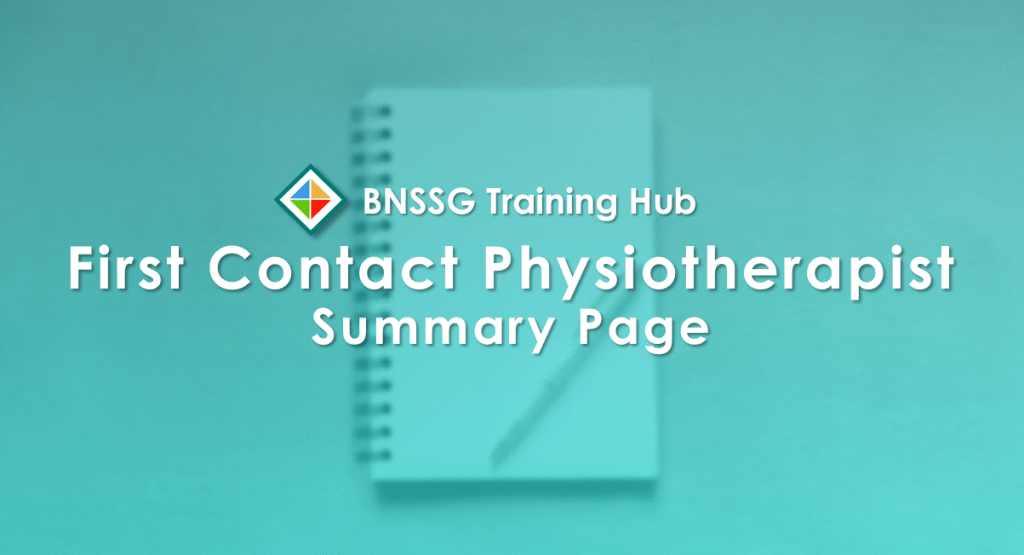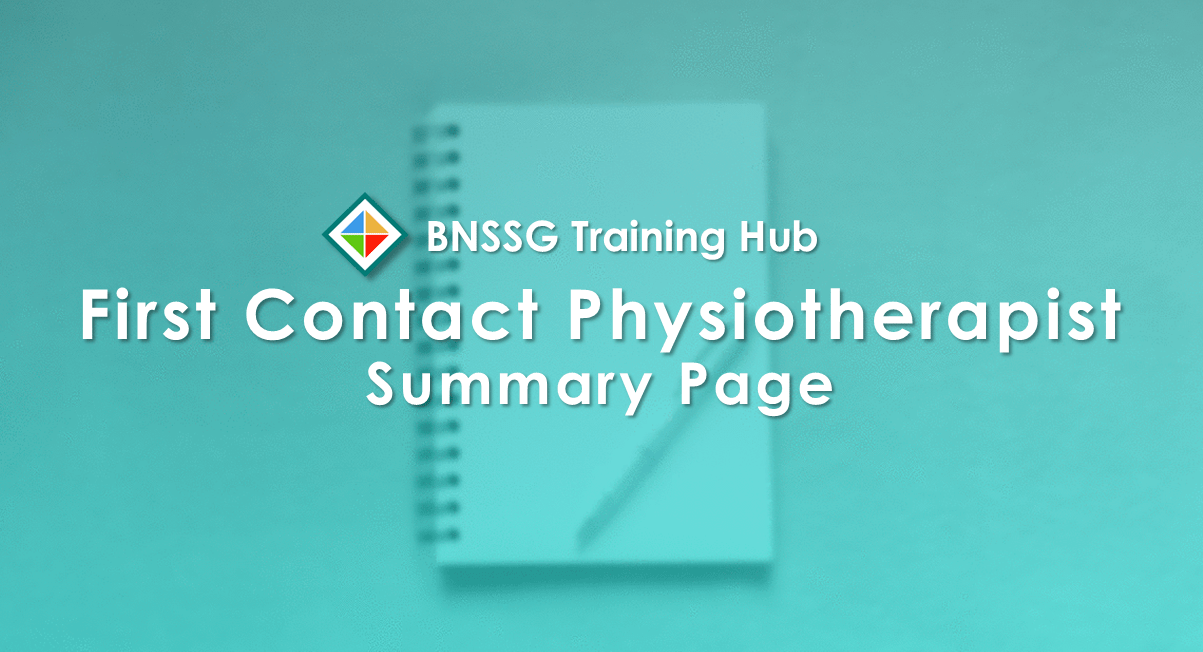Questions?
If you have any questions relating to first contact physiotherapists, or even to advanced physiotherapists, please feel free to contact our ACP Lead, Kerri Magnus, at kerri.magnus2@nhs.net.
HEE’s Roadmap to Practice
HEE has published their Roadmap to Practice for first contact physiotherapists, which features a wealth of information pertaining to the role’s requirements and paths to progress to advanced practice.
To read it, please click here.
UPDATED: To watch HEE and the CSP’s webinar on the Roadmap to Practice, please click here.
Updates
What are they?
What benefits can they bring?
What is their scope of practice?
Is funding available for them?
Are there any case studies?
What training, qualifications, and competencies should they have?
What educational pathways are there?
NEW: How does the ARRS link to HEE's Roadmap?
Are they eligible for the apprenticeship levy?
Any example job descriptions?
Any sample interview questions?
What clinical supervision do they need?
NEW: What ongoing support is available?
Updates
This first contact physiotherapy summary page was last updated on 05.05.21. The following sections were updated:
- How does the ARRS link to HEE’s Roadmap?
[Under ‘How do you employ a first contact physiotherapist?’] - What ongoing support is available?
[Under ‘What support do first contact physiotherapists need?’]
What are first contact physiotherapists?
First contact physiotherapists are the first point-of-contact for patients with MSK conditions in primary care; they are at the top of their clinical scope of practice at Agenda for Change Band 7 (A Roadmap to Practice, see below).
They are qualified to assess, diagnose, treat, and manage patients, and when appropriate, can discharge them without a medical referral. They refer patients to GPs to address non-MSK conditions and pharmacology outside their agreed scope of practice.
They also have a range of clinical and service-based responsibilities, playing an important role in supporting ongoing educational and research development within primary care.
A Roadmap to Practice
Produced by HEE, this document provides a roadmap of education for practice, for all first contact physiotherapists working in primary care.
To read this document, please click here.
What benefits can first contact physiotherapists bring?
The presence of first contact physiotherapists in multi-disciplinary teams can help to release time for GPs; one-in-five GP appointments are about musculoskeletal conditions, thereby allowing them to address other presentations. Physiotherapists may also bring an increased focus on lifestyle issues, such as smoking, drinking, and lack of sleep; all these issues can exacerbate muscle pain, and physiotherapists are well-placed to assist in ensuring that patients can be pain-free and mobile.
Please see What MSK First Contact Physiotherapists can offer you below for more information.
“In my view and experience [first contact physiotherapists] are a valued and now essential member of the primary care team. The role is effective both in delivering great outcomes and experience for patients but also in our area resilience for practices. Their approach in my experience empowers patients to better self-manage their condition and become less reliant on traditional medical approaches such as analgesia.“
Dr. Darren Cocker
GP, Lydden Surgery
Deputy Governing Body Member, Kent and Medway CCG
GP Tutor, HEE
(Ref. What MSK First Contact Physiotherapists can offer you)
What MSK First Contact Physiotherapists can offer you
Produced by the Chartered Society of Physiotherapy, this page outlines the case for first contact physiotherapists and the benefits you can expect from employing them.
To visit this page, please click here.
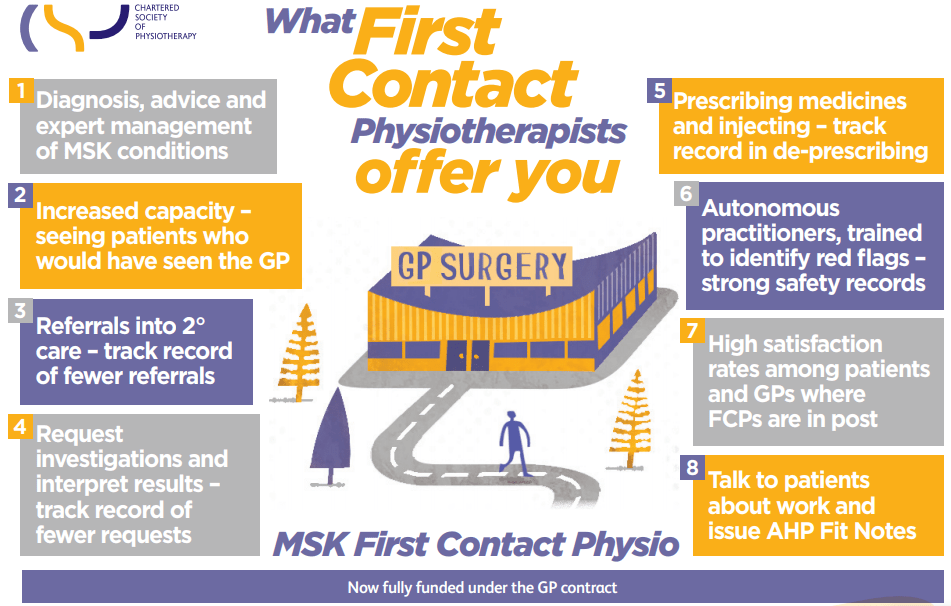
What is the scope of their practice?
First contact physiotherapist appointments typically last 20 minutes, to provide ample time for safe and effective consultation. Most appointments involve assessment, diagnosis, and first-line treatment, but first contact physiotherapists are qualified to:
- Assess and diagnose — this includes screening for serious pathologies
- Refer for a course of treatment
- Refer to orthopaedic / rheumatology / pain services
- Convey information about self-care and facilitate behaviour change
- Discuss physical activity and health — i.e., discuss the negative impact of lifestyle choices on a patient or service user’s health (e.g., smoking)
- Appraise fitness for work
- Conduct social prescribing
- Conduct medicines optimisation
- Request investigations
- Administer soft-tissue injections (if qualified)
For more information, please consult CSP’s About First Contact Physiotherapist services page below.
About First Contact Physiotherapist services
Produced by the Chartered Society of Physiotherapy, this page answers several FAQs about the scope and function of first contact physiotherapy in primary care.
To visit this page, please click here.
How much training do they have?
According to HEE’s e-Learning for Health platform, to work in primary care FCPs must have completed a physiotherapy degree (BSc).
For Band 7 roles, FCPs must complete the HEE Primary Care FCP capability training, at minimum, and be backed by appropriate governance and indemnity. For Band 8A roles, this training should be completed and the FCP must be working at an advanced level of practice (e.g., at Master’s level) across all four pillars of Advanced Practice.
(Source: First Contact Physiotherapist,
HEE)
For more information, please consult HEE’s First Contact Practitioners and Advanced Practitioners in Primary Care: (Musculoskeletal) A Roadmap to Practice, via the button below.
Is funding available for them?
First contact physiotherapist roles created from 31 March 2019 onward will likely be funded, in part, by PCNs through the Additional Roles Reimbursement Scheme (ARRS), as detailed in the five-year framework for GP services agreed between NHS England and the BMA General Practitioners Committee (GPC). The scheme is projected to produce around 20,000+ additional posts in five reimbursable primary care roles by 2023 / 24, including the first contact physiotherapist role.
Through ARRS, NHS England will reimburse employment on-costs, in addition to 70% of ongoing salary expenses.
This is but only one way in which to secure funding for first contact physiotherapists, however.
For more, please consult HEE’s Implementation Guide using the collapsible box below.
HEE's Implementation Guide
This document addresses capability frameworks and governance issues around introducing implementation of first contact physiotherapists.
To read it, please click here.
What training, qualifications, and competencies should a physio have?
Please find below links to two significant documents which will help service providers, managers, and physiotherapists themselves to identify what training, qualifications, and competencies they should have to safely and effectively practice at first contact and advanced practice levels.
A Roadmap to Practice
HEE are in the process of producing a roadmap of education for practice for all first contact practitioner roles, including physiotherapists. This roadmap sets out:
- The definition of first contact roles, their respective training processes, and educational pathways
- The definition of advanced practice roles, their respective training processes, and educational pathways
- How to build a portfolio of evidence for both first contact and advanced practice roles
As such, this document should be considered invaluable when determining what skills and knowledge a first contact physiotherapist should have under their belt to practice and progress.
To read this document, please click here.
Musculoskeletal Core Capabilities Framework (CCF)
Skills for Health, Health Education England, NHS England, Public Health England, and the Arthritis and Musculoskeletal Alliance (ARMA) have collaborated to produce an MSK Core Capabilities Framework. This document is intended to provide a resource by which first contact physiotherapists can demonstrate and evidence how they meet the capabilities required for the role, and to assist them in identifying their specific learning needs.
To read this framework, please click here.
Are there any case studies?
NHSE / I have produced a document featuring the details of 16 first contact physiotherapist case studies, which you may access using the button below.
Are physios eligible for the apprenticeship levy?
The short answer is yes — to access it, a first contact physiotherapist will need to secure the backing of a GP and their practice manager, before reaching out to the Training Hub. It is then a matter of applying to UWE’s apprenticeship scheme.
For more information, please do contact our ACP Lead, Kerri Magnus, at kerri.magnus2@nhs.net using the button below.
Alternatively, you can download MSc AP Apprenticeship Programme to read more about UWE’s scheme for advanced clinical practitioners.
MSc AP Apprenticeship Programme
This document provides information on UWE’s apprenticeship programme for advanced clinical practitioners.
To read it, please click here.
What academic qualifications should an FCP have?
An FCP should be pursuing one of the following routes to become qualified:
- Completing a BSc Physiotherapy degree at a recognised university
- Completing a BSc Degree Apprenticeship, combining on-the-job training with university-level learning an study
- Completing an integrated Master’s degree — a four-year, full-time course combining undergraduate and postgraduate study into a single course
- Completing a Master of Science degree for those who have studied at undergraduate level in another relevant subject area: (e.g., biological sciences, psychology, or sports science, consisting of a range of lectures, placements, and assessments over 2 years
Generally speaking, an FCP should have 1,000 placement hours under their belt, though this can vary depending on the qualification they’re pursuing.
Detailed information on accredited university courses can be found at this link:
Find a physiotherapy programme | The Chartered Society of Physiotherapy (csp.org.uk)
Any example job descriptions?
The Chartered Society of Physiotherapy (CSP) has kindly produced two example job descriptions for Band 8A and Band 7 first contact physiotherapists. As they state, however, these JDs are only examples, providing a broad overview of the responsibilities of the role; local JDs will be structured differently, reflecting local needs.
Likewise, HEE has example JDs on their e-Learning for Health Hub, though it should be noted that these are still being drafted and therefore subject to change.
Please note: the banding is a point of reference for allied health professionals and their employers, and is not a reflection of the capability of the individual. In primary care, pay is negotiated on an individual basis.
Any sample interview questions?
We will provide sample interview questions soon. Thank you for your patience.
What clinical supervision do you need to provide?
HEE stipulates that the clinical supervision you provide should build the first contact physiotherapist’s confidence, capability, clinical reasoning, and critical thinking. As such, it should include:
- Regular supervision within practice
- A routine debrief (at least daily) to ensure patient and practitioner safety
- A high-quality feedback process, to help with addressing practitioner and patient uncertainty
- A Workplace-Based Assessment (WPBA) to assess the application of knowledge, skills, and behaviours in primary care
For information on how to become a first contact physiotherapist’s supervisor, please consult the illustration and relevant documents below.
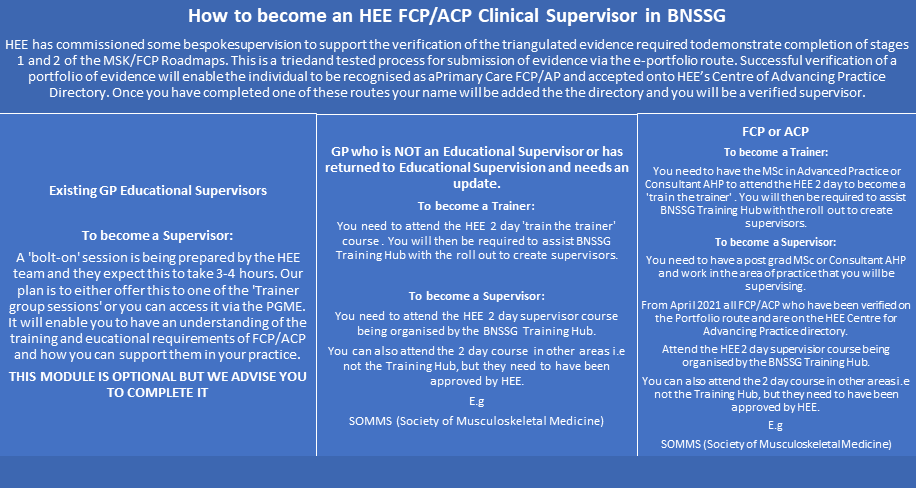
HEE Clinical Supervision for FCPs / ACPs FAQs
Compiled by Kerri Magnus, this document addresses many frequently asked questions surrounding clinical supervision for first contact practitioners and advanced clinical practitioners (including first contact physiotherapists).
To read it, please click here.
HEE's FCP / ACP Roadmap Supervision slides
Provided by HEE, this slide deck outlines the supervision process for first contact practitioners and advanced clinical practitioners.
To read it, please click here.
HEE's Workplace Supervision for Advanced Clinical Practice guide
Produced by HEE, this document is intended for employers and supervisors, to support them in delivering high-quality workplace supervision to advanced clinical practitioners in training.
To read it, please click here.
What ongoing support is available?
There are various ways in which first contact physiotherapists can receive support, including:
The ACP Forum
Organised and led by our ACP Lead, Kerri Magnus, The ACP Forum can assist first contact physiotherapists on the journey to becoming an advanced clinical practitioner. The Forum can signpost to relevant education and training, provide 1-to-1 guidance, and facilitate networking with like-minded colleagues from across BNSSG.
To visit The ACP Forum’s site, please click here.
1:1 Sessions
Kerri Magnus, our ACP Lead, is available to run 1:1 sessions for advanced clinical practitioners, in which they can create their own individual pathways, relevant to their role and practice goals. These will be 15-30 minutes, and GPs / Practice Managers are also welcome to book a slot, should they wish to ask any questions relating to first contact practitioners or advanced clinical practitioners.
You can contact Kerri at kerri.magnus2@nhs.net, by clicking here.
NEW: The Hub's FCP (MSK) Lead
On 1 May, BNSSG Training Hub welcomed Lizzie Bradshaw as our FCP (MSK) Lead! She is here to aid first contact physiotherapists in setting your objectives and keeping up-to-date on the progress of our physiotherapist projects.
She has already linked in with regional and national teams to represent Bristol, North Somerset, and South Gloucestershire, and will use the community of practice as a platform to build a network with our partners in the community and social care sectors.
If you would like to get in touch with Lizzie, please contact zach.barber@nhs.net and he can pass you on.
interactiveCSP
The iCSP is a forum on the Charted Society of Physiotherapy’s site, which provides its members with access to a range of online physiotherapy networks.
To find out more, please click here.
Our Quality Improvement Project
Kerri Magnus has also designed a survey to establish the learning needs of all advanced clinical practitioners (even if still in training), including physiotherapists. Initially, this is aimed solely at advanced nurse practitioners (ANPs), as it is benchmarked against the core capabilities framework, but it will be rolled out to other roles in due course.
To find out more, please click here.
What educational pathways are there?
At present, there are two main educational pathways by which one can train to be a first contact or advanced physiotherapist:
- Via an FCP portfolio and taught routes, with onward portfolio route or a taught Advanced Practice master’s to become an Advanced Practitioner
- Via an AP portfolio or taught routes with the addition of the required primary care KSA training
The diagram below provides a visual representation of this routes.
For more information, please see HEE’s Roadmap to Practice using the collapsible box below.
A Roadmap to Practice
Produced by HEE, this document provides a roadmap of education for practice, for all first contact physiotherapists working in primary care.
To read this document, please click here.
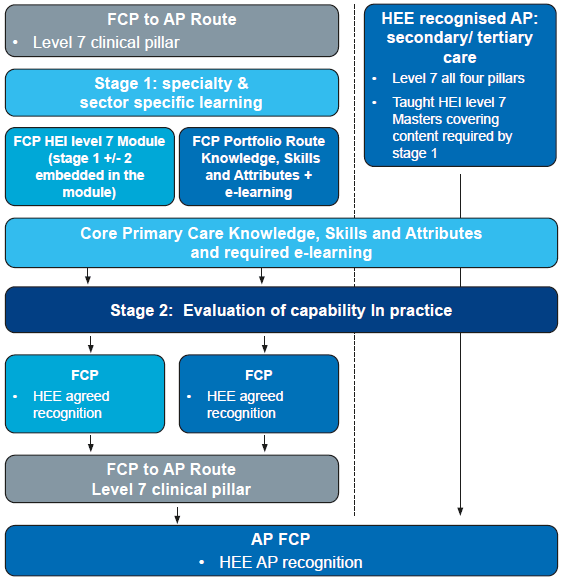
How does the ARRS link to HEE's Roadmap?
First contact physiotherapists employed under the Additional Roles Reimbursement Scheme (ARRS) no longer have a deadline of April 2022 to complete HEE’s Roadmap to Practice to enable drawing down of funding.
If you are not employed under ARRS, there is no current deadline either. Completion of the HEE Roadmap is still advised for all staff. If you wish to be on the Centre for Advancing Practice Directory, you will need to have been signed off for stages 1 & 2 of the FCP Roadmap before moving on to advanced clinical practice at stage 3.
Both stages can be completed in general practice and signed off by a verified clinical roadmap supervisor, or you can attend a taught route. You will still need to have evidence of clinical supervision by a roadmap supervisor to ensure competency, though.
For weekly updates here, please refer to HEE’s site using the button below.
Literature
A Roadmap to Practice
Produced by HEE, this document provides a roadmap of education for practice, for all first contact physiotherapists working in primary care.
To read this document, please click here.
About FCP services
Produced by the Chartered Society of Physiotherapy, this page answers several FAQs about the scope and function of first contact physiotherapy in primary care.
To visit this page, please click here.
BMA's 'urgent prescription for general practice'
To read the BMA’s April 2016 report on the state of general practice, click here.
HEE Clinical Supervision for FCPs / ACPs FAQs
Compiled by Kerri Magnus, this document addresses many frequently asked questions surrounding clinical supervision for first contact practitioners and advanced clinical practitioners (including first contact physiotherapists).
To read it, please click here.
HEE's easy-read
To read HEE’s easy-read guide on first contact physiotherapists, click here.
HEE's FCP / ACP Roadmap Supervision slides
Provided by HEE, this slide deck outlines the supervision process for first contact practitioners and advanced clinical practitioners.
To read it, please click here.
HEE's Implementation Guide
This document addresses capability frameworks and governance issues around introducing implementation of first contact physiotherapists.
To read it, please click here.
HEE's Workplace Supervision for Advanced Clinical Practice guide
Produced by HEE, this document is intended for employers and supervisors, to support them in delivering high-quality workplace supervision to advanced clinical practitioners in training.
To read it, please click here.
MSc AP Apprenticeship Programme
This document provides information on UWE’s apprenticeship programme for advanced clinical practitioners.
To read it, please click here.
MSK Core Capabilities Framework (CCF)
Skills for Health, Health Education England, NHS England, Public Health England, and the Arthritis and Musculoskeletal Alliance (ARMA) have collaborated to produce an MSK Core Capabilities Framework. This document is intended to provide a resource by which first contact physiotherapists can demonstrate and evidence how they meet the capabilities required for the role, and to assist them in identifying their specific learning needs.
To read this framework, please click here.
What MSK First Contact Physiotherapists can offer you
Produced by the Chartered Society of Physiotherapy, this page outlines the case for first contact physiotherapists and the benefits you can expect from employing them.
To visit this page, please click here.
A/V resources
A Roadmap to Practice webinar
Delivered by HEE and the Chartered Society of Physiotherapists, this webinar provided attendees with the chance to ask practical questions regarding starting a portfolio and finding support.
For more information and to watch this webinar, please click here.
Introduction to First Contact Physiotherapy
Provided by Somerset NHS Foundation Trust, this succinct animation considers who first contact physiotherapists are and what they can do.
To watch it, please click here.
[This video was published on 03/11/20]
An Essential Update about First Contact Practitioners and Advanced Clinical Practice in primary care
Arranged by Somerset LMC and Somerset Training Hub, this 1.5 hour webinar provides a concise, ideal look at the scope and requirements of first contact / advanced clinical practitioners (FCPs / ACPs), and at how best to provide the support, supervision, and conditions they need to thrive.
A range of individuals contributed, including our own ACP Lead, Kerri Magnus.
For more information, and to watch this webinar, please click here (do note that you will need to register).
[This webinar was held on 04/02/21]
FCPs in primary care: video series
To watch the Chartered Society of Physiotherapy’s video series on FCPs working in primary care, please click here.
[These videos were last reviewed on 31/01/19]
NEW: HEE FCP Roadmap Webinar
On Wednesday 24 March, HEE will be holding a webinar on their first contact practitioner (FCP) Roadmaps to Practice. This webinar will be of interest to those in MSK and paramedic roles and will specifically cover the portfolio route through, with guidance and insights into how delegates can look to build their portfolios.
A recording will be available soon on HEE’s Roadmaps Landing Page. Click here to visit this page.
Stage 1 of the First Contact Physiotherapist Roadmap
To watch this video from Sussex MSK Partnership, please click here.
[These videos were last reviewed on 09/02/21]

